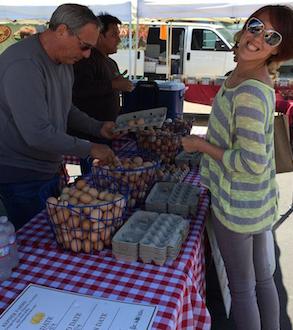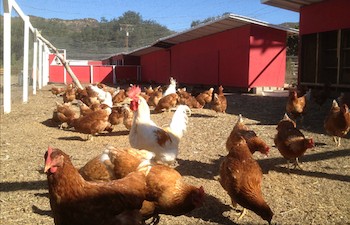Former Dude Ranch Near Lake Elsinore Finds Success as Sustainable Pastured Lamb and Poultry Farm
April 28, 2016 | AJ Hughes

Kepner Farms sells eggs at the Manhattan Beach farmers’ market. (photo courtesy Carl Kepner/Kepner Farms)
Near Lake Elsinore, California, a former dude ranch is now home to pastured lamb and poultry.
Its transformation began when Carl Kepner inherited the land in 2010 and began Kepner Farms. It took some trial and error, however, for the business to arrive at its current incarnation.
Kepner started with aquaponics, and by 2012 was selling agricultural products. But he did not like the overall performance he was getting through his aquaponics operation, and switched over to traditional planting.
“I like soil better,” he says.
But realizing that growing fruits and vegetables was too labor-intensive for his liking and wanting to make permaculture a central theme of his operation, Kepner decided to raise pastured lambs and chickens. Now, Kepner Farms features 2,000 chickens and 250 head of sheep and lambs.
In essence, all of the meat produced by Kepner Farms is organic.
“We’re as organic as you can get without being certified-organic,” he says.
This means that nothing raised there is given antibiotics or hormones. All lamb are pasture-fed, and all chickens are free-range.
Food and ranching are in Kepner’s blood. He grew up on a ranch in Woodland Hills, California. It was owned by one set of grandparents; the other set owned grocery stores. Prior to his farming venture, he owned restaurants. Providing high-quality meat is now his passion.
“My vision is to bring great food to markets,” he says.
He’s been successful in doing this, yet his main customers are located not in Riverside County, but in affluent areas of Orange and Los Angeles counties. These include farmers’ markets in some of the priciest zip codes—Westlake, Brentwood, Larchmont, Pacific Palisades, Manhattan Beach and Irvine. Kepner also sells to two membership-based co-op-type markets in Pasadena—Culture Club 101 and Our Little Market—as well as one restaurant. He hopes soon to sell meat at a Temecula farmers’ market.
In addition to lamb and chickens, Kepner has added Pekin ducks to the farm lineup. They produce tasty eggs. He has also found a market for chicken necks, backs and feet, which are used to make broth.
“Folks are going ape for bone broth,” he says.
Like most farmers and ranchers, Kepner deals with his fair share of challenges and frustrations. Citing what he feels is state overregulation of farms and farmers’ markets, he has decided not to expand egg production but instead to focus on meat—primarily lamb.
“I picked and chose the easiest way—it’s easiest with sheep,” he says.
He will still be in the business of raising chickens for meat and ducks for their eggs, but any growth will center around lamb production.
Looking to the future, Kepner is eyeing the possibility of opening a grocery store in northern Orange County. Of course, it would feature products from Kepner Farms.
Future visions such as this are relevant because the farm is economically sustainable.
“We’re viable because we own the land,” says Kepner. “We also have our own water source.”

Kepner Farms, located in Lake Elsinore, California, raises freerange chickens. (photo courtesy Carl Kepner/Kepner Farms)
He views his farm, which comprises more than 400 oak trees and is located in the Cleveland National Forest, as a “diamond in the rough.” He hopes and expects Kepner Farms to continue contributing to a growing local food system in Riverside County, Orange County, and the broader region of Southern California.
“Local food gets people back to the farm and improves health,” says Kepner, pointing to the profound economic and environmental impacts a strong local food system can have on a region. He views Europe as an example of how to do it right, and views Orange County as an example of out-of-control urban sprawl.
“In Europe, they don’t denigrate farmland. But in San Juan Capistrano, the beautiful valley is almost gone,” he says.
In the end, Kepner is optimistic that farms like his won’t merely restore the region’s agriculture roots, but lessen Southern California’s dependence on California’s Central Valley and other regions for its food needs.











Submit a Comment